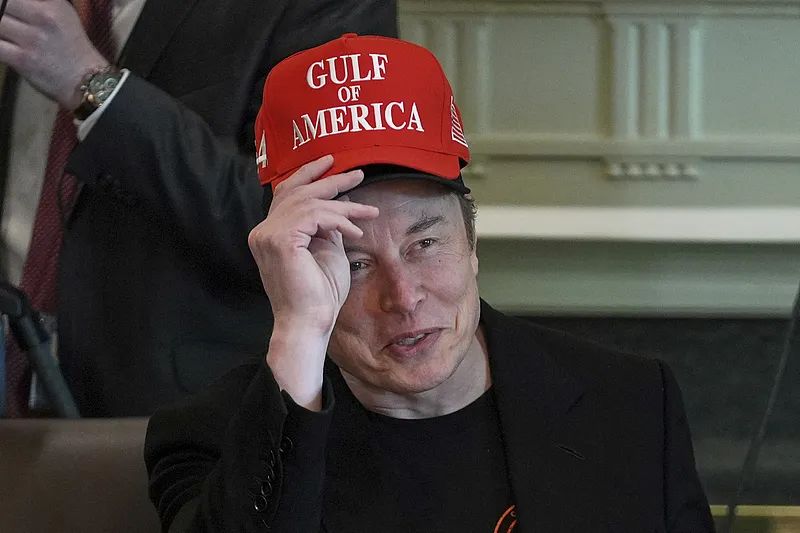Written by Jin Yan, special contributor to Caijing

On Thursday, May 1, local time, the U.S. media reported that U.S. National Security Advisor Mike Waltz is about to leave his post and be transferred to the U.S. Ambassador to the United Nations. The vacancy will be filled by Secretary of State Rubio. Waltz's deputy Alex Wong will also leave. He helped arrange the summit between Trump and North Korean leader Kim Jong-un and is one of the few senior officials with practical diplomatic experience in East Asia. Witkoff, U.S. President Trump's special envoy for the Middle East, is considering replacing Mike Waltz as national security advisor, but has not yet made a decision.
Trump's first term was characterized by frequent changes in senior management, but Trump's second term did not introduce the first major personnel changes until he had been in the White House for 100 years. The National Security Council (NSC) is the core agency for successive US presidents to formulate and coordinate security policies, and its members often make key decisions on global hot conflicts. Waltz is seen as an official who firmly supports traditional security alliances (such as NATO) and is also a more moderate voice in the Trump administration who advocates external coordination. This change came so suddenly that even US State Department spokesperson Tammy Bruce learned the news from reporters at a briefing that day.
Meanwhile, Musk, the world's richest business tycoon who was once the most popular at the beginning of the year, has lost his power and has been squeezed out of the core decision-making circle. On Wednesday, April 30, local time, Musk announced at a White House meeting that the Department of Government Efficiency (DOGE) he led has saved $160 billion in expenses so far. This is far from his promise last fall to "cut at least $2 trillion."
Some institutions have calculated that "layoffs, rehiring, productivity losses, and paid leave for thousands of workers related to DOGE will cost more than $135 billion this fiscal year," which means that the DOGE project may actually lead to an increase in net government spending.
Double Out
Musk played a very special role in the Trump administration by supporting Trump's election with a nine-digit campaign fund. He not only frequently participated in telephone consultations with foreign heads of state, but also hosted high-level meetings at the Pentagon and the National Security Agency, and even talked directly with Indian Prime Minister Modi. Today, Trump's right-hand men are gradually taking shape, including trade adviser Navarro, who has become a key figure in the Trump administration. Because no one dares to challenge his views head-on, Navarro has a rare "one-man show" status; the other is Treasury Secretary Bessant, whose voice and influence have risen as Trump's policies have shaken the dominance of the US dollar and "sold out the United States". Musk happened to have a fierce dispute with these two White House bigwigs. Treasury Secretary Bessant and Musk "swore" outside the presidential office; Musk called Navarro an "idiot" on the social platform X.
According to US media, the first female White House Chief of Staff, Wiles, played an important role in Musk's exit. She believed that Musk's physical office in the White House would threaten the spirit of cooperation she wanted to establish. Her struggle greatly reduced Musk's chances of appearing in the West Wing of the White House, and he eventually faded out.
On April 30, Musk attended a cabinet meeting at the White House wearing two hats, one was Trump's favorite red "American Gulf" hat, and the other was a DOGE hat. Musk repeatedly changed hats during the meeting and finally decided to wear the two hats on top of each other. Musk, who wants to play with two hats in politics and business, is now facing the end of being eliminated from both.
Musk's official position in the cabinet will end around May 30, after which he will serve as an informal adviser. In addition, due to the decline in the share price of US automaker Tesla and some investors' dissatisfaction with Musk's deep involvement in politics, Tesla's board of directors began to seriously consider finding Musk's successor. Although Tesla subsequently rarely publicly denied it, Musk's negative asset to Tesla has caused its first-quarter revenue to fall by 9% year-on-year, its automotive business revenue to fall by 20% year-on-year, and its net profit to plummet by 71% year-on-year.
Musk told investors in a Tesla earnings call that starting in May, he will significantly reduce his working hours at DOGE and refocus on Tesla. Tesla's brand has been severely damaged by Musk's political work and faces performance challenges - sales and performance have fallen sharply. An unnamed employee of the Government Efficiency Department told Caixin that Musk had taken the lead in proposing that government workers must work 40 hours a week in the office, otherwise they would lose their jobs. Because they found that basically 10 US government civil servants were doing work that could be done by one person, Musk chose to go to war with a large group of government employees, and this interest group vented all their dissatisfaction on Musk.
Musk is regarded as the soul of Tesla. Dan Ives, an analyst at Wedbush Securities, once said: "Tesla is Musk, and Musk is Tesla." However, Tesla is currently facing many difficulties, including an aging product line, increasing competition from China, and the DOGE campaign and the political backlash it triggered, which have led to a decline in both product demand and profits.
Musk's rocket and satellite company is working with software maker Palantir and drone maker Anduril to bid to build key parts of the Golden Dome, a project that has attracted great interest from the rapidly growing defense startups in the technology industry. It is reported that Musk's SpaceX and two partners are expected to win the bid for key parts of US President Trump's "Golden Dome" missile defense system. But 42 Democratic lawmakers have called for an examination of Musk's role in the bidding process for this missile defense system.

Musk's SpaceX has attracted a lot of attention. SpaceX and two partners are expected to win the bid for key parts of US President Trump's "Gold Dome" missile defense system. Photo by Jin Yan
Personnel turmoil
Waltz came under scrutiny in March for mistakenly adding Jeffrey Goldberg of The Atlantic to a Signal chat. Goldberg disclosed Waltz's discussions with senior national security officials about plans for U.S. military strikes against Houthi targets in Yemen. After Waltz admitted the authenticity of the report behind closed doors, White House officials debated whether he should resign, but Waltz never offered to resign, and Trump did not ask him to resign at the time. Trump has publicly expressed support for Waltz, calling him "a good guy" who "learned his lesson."
Waltz's resignation marks the end of a month of personnel turmoil within Trump's national security apparatus. Since April 1, the National Security Council has fired at least 20 members, resulting in severe staff shortages in several key departments. People familiar with the matter revealed that the actual scale of layoffs was greater than previously reported, causing some key agencies involved in national security to be short of staff.
The layoffs were caused by conservative commentator Laura Loomer submitting a list of officials who were accused of being "disloyal" to President Trump. About 15 people were fired in the first week, and the layoff process is still ongoing. According to the media, several important departments within the NSC are currently facing a near-shutdown, including the working groups responsible for Latin American policy, international organization affairs and legislative affairs.
In addition, the U.S. Department of Defense fired three senior officials on April 18 for allegedly "unauthorized disclosure of national security information." The three officials subsequently issued a joint statement firmly denying the allegations and accusing the Pentagon of "baseless slander" against them. The U.S. Department of Defense previously launched an investigation into a number of "leaks" to determine how sensitive information such as the second U.S. aircraft carrier heading to the Red Sea, the U.S. military's military action plan against the Panama Canal, the visit of Musk, head of the "Department of Government Efficiency," to the Pentagon, and the U.S. suspension of intelligence collection for Ukraine were exposed by the media.

The US Department of Defense has launched an investigation into multiple "leakage incidents". Photo by Jin Yan
After Trump returned to the White House, the Pentagon has carried out a "purge" of senior officials, firing senior officials such as Charles Brown, Chairman of the Joint Chiefs of Staff appointed by the Biden administration, in February.
The purges have dealt a severe blow to morale in parts of the national security apparatus, the officials said, adding that some parts of the government lack relevant national security expertise and in some cases have difficulty attracting senior talent.
















